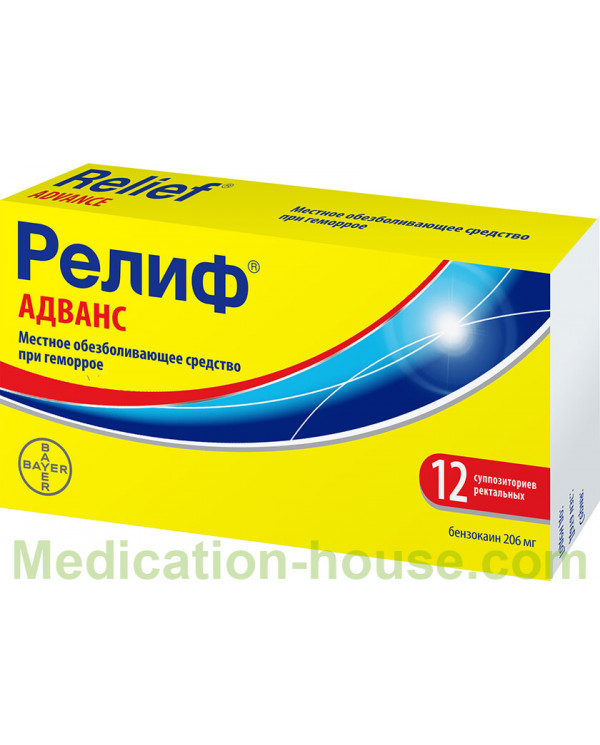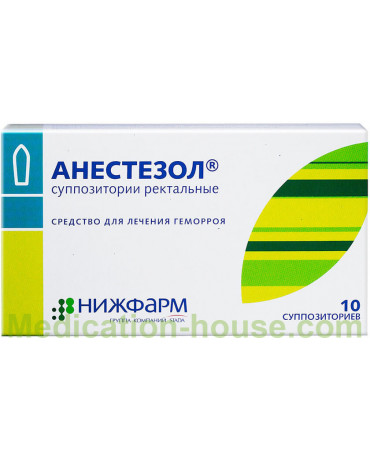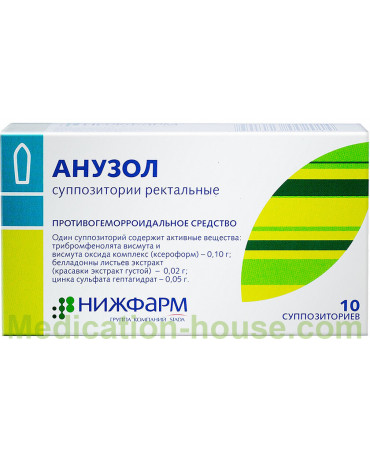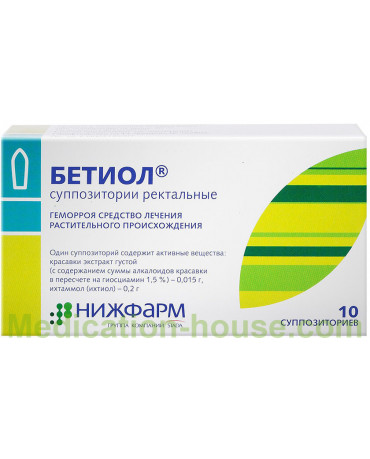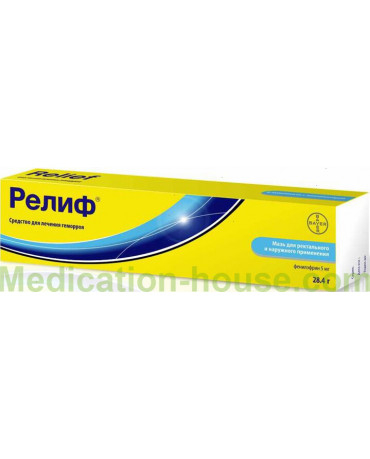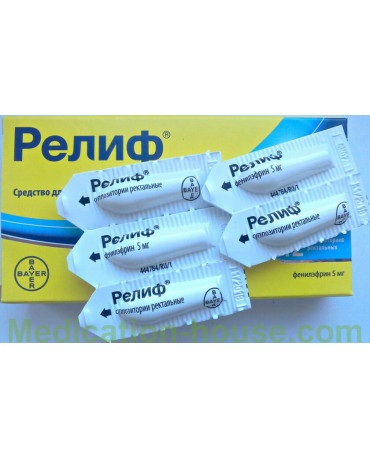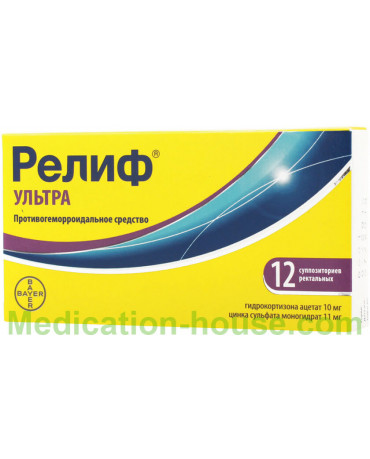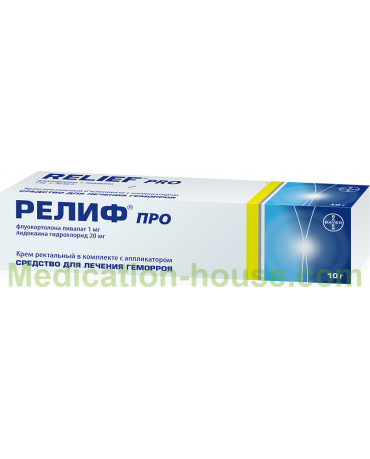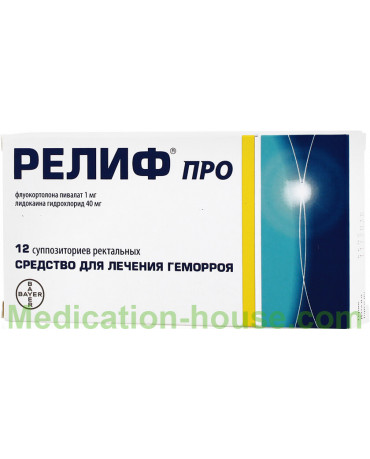Relief Advance instruction for use
Reed more and buy Relief Advance on this page
The composition and effect of the drug
The active ingredients of Relief Advance are benzocaine (anesthesin) and shark liver oil.
Anesthesin is a local anesthetic that manifests its properties when in contact with mucous membranes. He has no resorptive (systemic) effect.
Shark oil stimulates the immune system, suppresses inflammation and bleeding, and also nourishes the tissues with fat-soluble vitamins (retinol, calciferol, tocopherol), which accelerate the recovery process.
Auxiliary components (cocoa bean oil, petroleum jelly, etc.) soften the mucous membrane and facilitate defecation. Cocoa butter has a moderate healing effect.
Release form
Suppositories. The weight of 1 suppository is 2 g. The concentration of the anesthetic component in suppositories Relief Advance is lower than in the ointment: about 10% (206 mg). Convenient consistency and emollient effect are provided by additional components: cocoa butter and shark liver, corn starch and parahydroxybenzoates.
pharmachologic effect
The composition of the drug causes its anesthetic, healing, soothing, moderate hemostatic and immunomodulatory effects.
Pharmacodynamics and pharmacokinetics
Benzocaine reduces the permeability of the neuronal membrane for sodium ions and displaces calcium ions from receptors that are located on the inner surface of the cell. This leads to the suppression of neuron depolarization.
As a result of blocking the nerve impulse with an anesthetic, the patient no longer feels pain in the area of inflammation.
When applied to the surface of the mucous membranes, the effect of anesthesin is manifested within a few minutes. Absorption of the substance into the systemic circulation is minimal.
Acceleration of tissue regeneration processes is due to the impact of fat-soluble vitamins (A, E, D). Local anti-inflammatory action is provided by alkylglycerol and squalene, which stimulate the activity of leukocytes at the site of injury.
Squalene also strengthens the vascular walls and helps to reduce bleeding.
Indications Relief Advance
The use of the drug is recommended for the following indications:
hemorrhoids;
fissures and erosion of the anal area;
inflammation of the rectum, which is accompanied by severe pain;
itching and burning of unspecified etiology in the anus;
rehabilitation after surgery;
analgesia of the anorectal zone before endoscopic diagnostic methods.
With hemorrhoids
With varicose hemorrhoidal veins and the formation of painful edematous nodes, local means with anesthesin help relieve unpleasant symptoms and alleviate the patient's condition before surgery.
Chronic
Chronic hemorrhoids are characterized by itching, pain during and after stool, and bleeding from the anus.
At later stages of the disease, knot prolapse may be observed. Benzocaine-based medications help to temporarily relieve discomfort, itching, burning and pain.
The fatty base of Relief Advance helps to eliminate the problem of constipation, preventing the increase in nodes.
For bleeding hemorrhoids, anesthetics should be combined with healing, decongestants and hemostatic drugs (sea buckthorn oil extract, bismuth and zinc compounds, etc.).
During exacerbation
Exacerbation of pathology occurs due to thrombosis or loss and infringement of nodes that swell intensely and cause severe pain.
In the absence of indications for emergency intervention for the treatment of acute hemorrhoids are used drugs with anesthetics, decongestants and antithrombotic agents.
Contraindications for Relief Advance
Application Relief Advance contraindicated in such conditions as:
hypersensitivity to drug components;
thromboembolic disease;
agranulocytosis.
Overdose of Relief Advance
With a significant excess dose of the drug, systemic side effects of benzocaine are observed. A large amount of anesthetic can trigger the following effects:
drowsiness;
nervous irritability;
anxiety;
in severe cases, blue skin and lips (cyanosis), respiratory disorders, convulsions.
The occurrence of respiratory disorders and cyanosis is associated with the effect of methemoglobinemia, an increase in the concentration of hemoglobin with a trivalent iron base that cannot transfer oxygen to the tissues.
A specific drug for treating anesthesia overdose is methylene blue. Its introduction is made intravenously.
Side effects
When using Relief Advance, itching, redness, burning and contact dermatitis (skin rashes) can occur in the anorectal zone.
Application and dosage
In case of internal localization of the nodes, suppositories Relief Advance with benzocaine are used, and in the case of combined and external hemorrhoids, ointment. Before using the medication, you should consult with your doctor.
Relief Advance is introduced up to 4 times a day immediately after the hygienic manipulations. Before the introduction it is necessary:
wash the anus area with slightly cool water or herbal decoction;
gently blot the intimate area with a soft cloth;
wash your fingers thoroughly;
open the package, remove the suppository and moisten its end with water;
lubricate the anus with a cream that contains petrolatum (in the presence of a lubricant, you can eliminate the wetting of the suppository);
lie on your side and pull one knee to your chest.
After performing these manipulations, you need to insert a suppository and remain at rest for 20-30 minutes to prevent the drug from flowing out when the base is melted. The procedure is recommended to be repeated in the morning, before a night’s rest, and after each bowel movement.
Drug interactions
When treating with antidepressants (including monoamine oxidase inhibitors) and antihypertensive drugs, it is necessary to control the use of local agents with benzocaine, strictly limiting the dosage and duration of the course.
In case of overdosing and prolonged use of the anesthetic drug, there is a possibility of enhancing the effect of antihypertensive drugs and reducing the effect of antidepressants.
special instructions
The use of the drug for the treatment of vulnerable groups of patients is solved individually.
Use in childhood
Patients under the age of 12 years are prescribed drugs with benzocaine only under strict indications. The course of treatment of children takes place under the supervision of a proctologist or therapist.
During pregnancy and lactation
Suppositories Relief Advance with benzocaine allowed to use from the beginning of the 2 trimester of gestation. Ointment is prescribed to pregnant women with caution.
Some components of the drug (cocoa butter, shark liver extract, etc.) can cause an allergic reaction in a child, so when breastfeeding the drug is prescribed only when the expected therapeutic effect exceeds the possible risk to the infant.
Storage conditions
The medicine must be protected from children and stored in a dark place at a temperature not exceeding + 25 ° C.
Shelf life - 2 years.
Disclosure of the tube does not shorten this period, provided that after each procedure the ointment is carefully closed with a cap.
Reviews
Reviews of suppositories Relief Advance with anestezin are mostly positive, but doctors clarify that the anesthetic is only symptomatic therapy and has little effect on the root cause of the disease and the frequency of exacerbations.
Some users note the effectiveness of the drug when used for other purposes (as a replacement for facial wrinkles cream), but this can lead to allergies and dry skin of sensitive skin.
Marat Vladimirovich (therapist)
Relief Advance with anesthesin is a good remedy for rectal pain of any etiology. I prescribe this remedy to patients 1 suppository 2-3 times a day. Reduction of pain is observed after the first use.
The claimed side effects in practice have not been met.
Benzocaine does not cure the underlying pathology, but is suitable as a temporary measure to alleviate the patient's condition.
Andrei Sergeevich (surgeon phlebologist)
An excellent drug for the treatment of exacerbation of hemorrhoids. Most effective is its use in combination with venotonics. In contrast to the classical Relief Advance, it has a local anesthetic effect, therefore, it is actively used both for cracks and hemorrhoids, and in the postoperative period.
In rare cases, one or more components are allergic.
Opinions of patients
Adel, 37 years old
After childbirth, hemorrhoids became severely exacerbated, so I had to go to the surgeon. For treatment, prescribed laxatives suppositories and Relief Advance anesthetic ointment.
Pain and burning go away within a few hours after the injection, especially if you follow all the rules and lie down after the procedure. The edema was completely asleep for 5-6 days after the first use, and the pain did not return after 2 days. The entire course of treatment can last from 7 to 12 days.
The minor drawbacks of the ointment are the relatively high cost of the medicine, the inconvenience of the administration and the need to wash the cap after each use. With internal hemorrhoids, it is more convenient to treat with suppositories.
Julia, 32 years old
Pregnancy and natural childbirth provoked severe hemorrhoids. Because of her employment, the child could not immediately go to the doctor and began to look for some ways to save herself from the pain herself. Having tried a lot of expensive and budget drugs, she stopped at Relief Advance.
These suppositories are worth a lot, but the effect comes after the first use. The suppositories themselves are soft, have no sharp smell and do not stain the laundry.
You can use them for a short time, so during treatment it is worthwhile to increase your fluid and fiber intake, start moving more and choose the time to go to the doctor. This will protect against the reappearance of pain.
Terms of sell
You don't need a prescription to buy Relief Advance.

